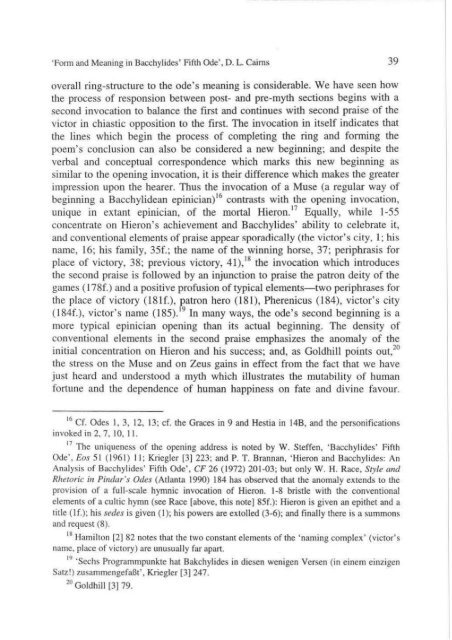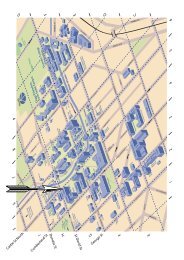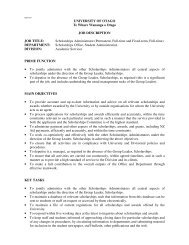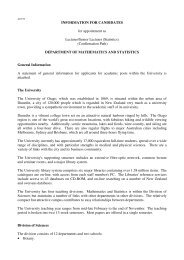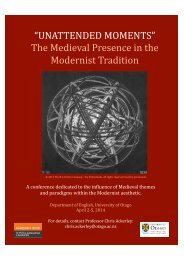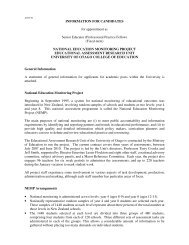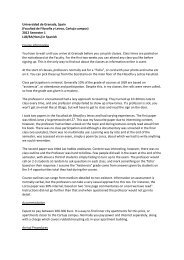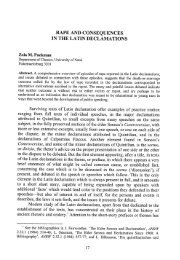scholia - University of Otago
scholia - University of Otago
scholia - University of Otago
You also want an ePaper? Increase the reach of your titles
YUMPU automatically turns print PDFs into web optimized ePapers that Google loves.
'Form and Meaning in Bacchylides' Fifth Ode', D. L. Cairns<br />
overall ring-structure to the ode's meaning is considerable. We have seen how<br />
the process <strong>of</strong> responsion between post- and pre-myth sections begins with a<br />
second invocation to balance the first and continues with second praise <strong>of</strong> the<br />
victor in chiastic opposition to the first. The invocation in itself indicates that<br />
the lines which begin the process <strong>of</strong> completing the ring and forming the<br />
poem's conclusion can also be considered a new beginning; and despite the<br />
verbal and conceptual correspondence which marks this new beginning as<br />
similar to the opening invocation, it is their difference which makes the greater<br />
impression upon the bearer. Thus the invocation <strong>of</strong> a Muse (a regular way <strong>of</strong><br />
beginning a Bacchylidean epinician) 16 contrasts with the opening invocation,<br />
unique in extant epinician, <strong>of</strong> the mortal Hieron. 17 Equally, while 1-55<br />
concentrate on Hieron's achievement and Bacchylides' ability to celebrate it,<br />
and conventional elements <strong>of</strong> praise appear sporaclically (the victor's city, 1; his<br />
name, 16; his family, 35f.; the name <strong>of</strong> the winning horse, 37; periphrasis for<br />
place <strong>of</strong> victory, 38; previous victory, 41), 18 the invocation which introduces<br />
the second praise is followed by an injunction to praise the patron deity <strong>of</strong> the<br />
games (178f.) and a positive pr<strong>of</strong>usion <strong>of</strong> typical elements-two periphrases for<br />
the place <strong>of</strong> victory (181f.), patron hero (181), Pherenicus (184), victor's city<br />
( l84f.), victor's name (185). 19 In many ways, the ode's second beginning is a<br />
more typical epinician opening than its actual beginning. The density <strong>of</strong><br />
conventional elements in the second praise emphasizes the anomaly <strong>of</strong> the<br />
initial concentration on Hieron and his success; and, as Goldhill points out, 20<br />
the stress on the Muse and on Zeus gains in effect from the fact that we have<br />
just heard and understood a myth which illustrates the mutability <strong>of</strong> human<br />
fortune and the dependence <strong>of</strong> human happiness on fate and divine favour.<br />
16<br />
Cf. Odes I, 3, 12, 13; cf. the Graces in 9 and Hestia in 148 , and the personifications<br />
invoked in 2, 7, I 0, II.<br />
17<br />
The uniqueness <strong>of</strong> the opening address is noted by W. Steffen, 'Bacchylides' Fifth<br />
Ode', Eos 51 ( 1961) II; Kriegler [3] 223; and P. T. Brannan, 'Hieron and Bacchylides: An<br />
Analysis <strong>of</strong> Bacchylides ' Fifth Ode', CF 26 (1972) 201-03; but only W. H. Race, Style and<br />
Rhetoric in Pindar's Odes (Atlanta 1990) 184 has observed that the anomaly extends to the<br />
provision <strong>of</strong> a full-scale hyrnruc invocation <strong>of</strong> Hieron. 1-8 bristle with the conventional<br />
elements <strong>of</strong> a cultic hymn (see Race [above, this note] 85f.): Hieron is given an epithet and a<br />
title (lf.); his sedes is given (I); his powers are extolled (3-6); and finally there is a summons<br />
and request (8).<br />
18<br />
Hamilton [2] 82 notes that the two constant elements <strong>of</strong> the 'naming complex' (victor's<br />
name, place <strong>of</strong> victory) are unusually far apart.<br />
19<br />
'Sechs Programmpunkte hat Bakchylides in diesen wenigen Versen (in einem einzigen<br />
Satz!) zusammengefaBt', Kriegler [3] 247.<br />
20 Goldhill [3) 79.<br />
39


